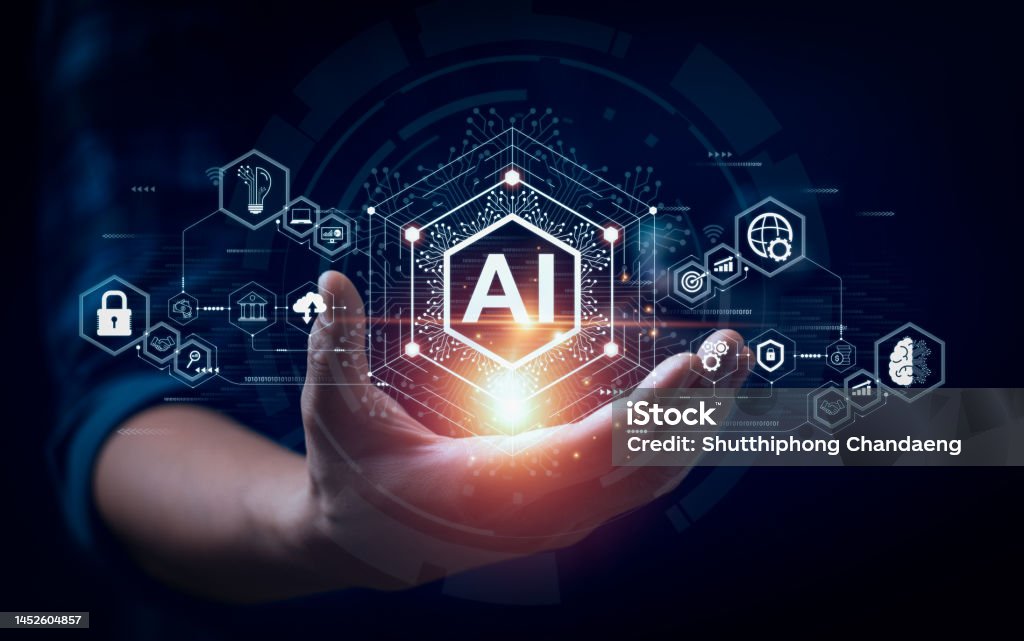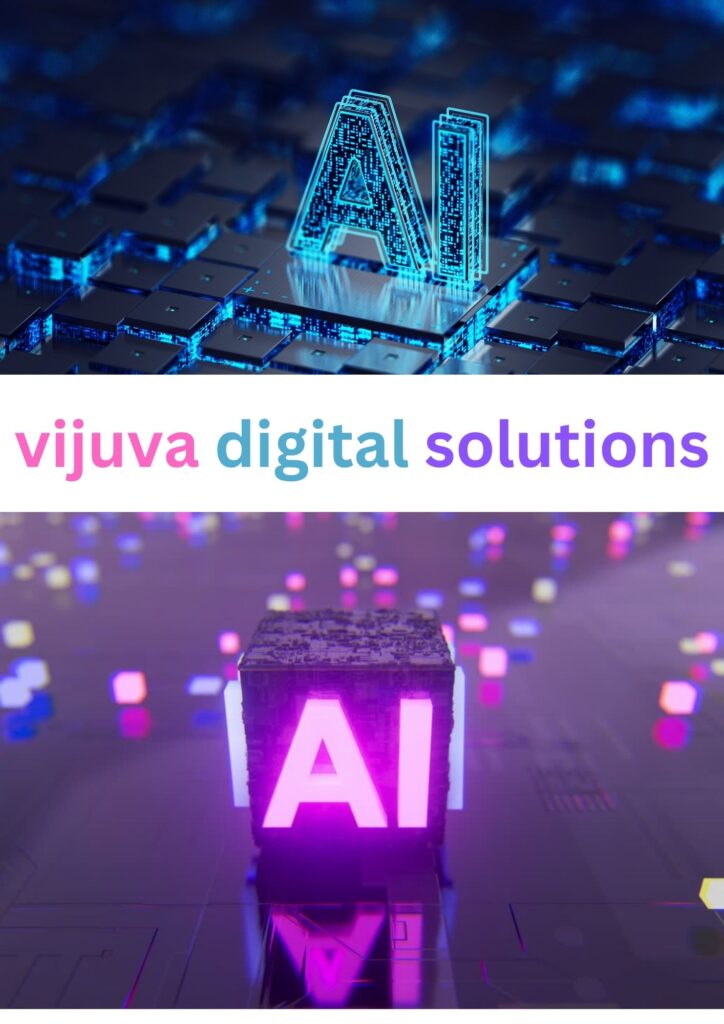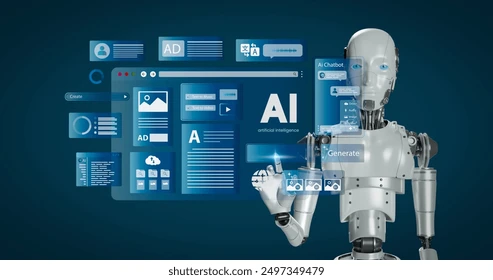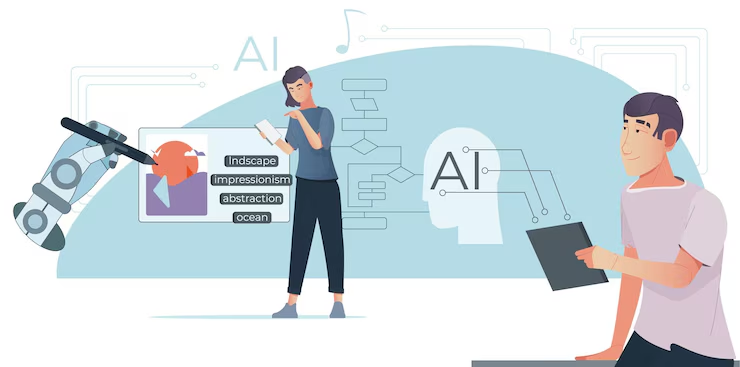Artificial intelligence, the most widely used technology in the modern world is a simple guide
It enables machines to function and consider like people.
AI features in every detail from vehicles to mobile phones.
The science known as artificial intelligence enables machines to:
Gain knowledge from data
What is Artificial intelligence?

Address issues
Recognize text, voice, and pictures
Easy Example:
ChatGPT responding to your inquiries
The quickest route is suggested by Google Maps.

Artificial Intelligence Types
✅ 1. Narrow AI (Weak AI)
- Works for specific tasks
- Example: Face recognition, Alexa, Siri
✅ 2. General AI
- Can think and solve problems like humans
- Still under development
✅ 3. Super AI
- Advanced and smarter than humans
- Only in movies and research (not real yet)
What Is the Process of Artificial Intelligence? (Step by Step)
✅ Step 1: Gathering Information
AI gathers information from various sources.
✅ Step 2: Structures of Learning
AI analyzes the data and finds trends.
✅ Step 3: Forecasting
AI makes projections and choices based on the learning.
✅ Step 4: Enhancing with New Information
as AI gains more data, it continues to advance.

Artificial intelligence Uses in Everyday Life
We already use AI in our daily lives. A few instances are:
The Google Assistant and Alexa are examples of voice assistants.
Suggestions on YouTube and Netflix.
Amazon purchases recommendations
Autonomous vehicles
Apps for medical diagnosis
Smart home appliances
✅ Deep Impact of Artificial Intelligence in Different Industries
Artificial Intelligence (AI) is not limited to just smartphones and voice assistants. It is now used in many industries to solve problems and improve services.
1. Healthcare Industry
AI is making healthcare smarter and faster:
- Doctors use AI to detect diseases like cancer at early stages.
- AI-powered apps track health, suggest diets, and provide fitness plans.
- Virtual doctors help patients with basic health advice.
Example:
AI can read X-ray and MRI scans to identify health problems quickly.
✅ 2. Education Industry
AI helps students learn better and makes education easier:
- AI recommends personalized study plans for students.
- Online learning platforms use AI to suggest courses based on interest.
- Teachers use AI tools to track student performance.
Example:
Apps like Duolingo and BYJU’S use AI to improve learning experiences.
✅ 3. Business and Marketing
AI helps businesses grow faster and smarter:
- AI chatbots reply to customer queries 24/7.
- Companies use AI for targeted ads and marketing campaigns.
- AI tools help analyze customer data to boost sales.
Example:
E-commerce websites use AI to show recommended products based on shopping history.
✅ 4. Finance and Banking
AI makes banking services quicker and safer:
- AI detects fraud in real-time by analyzing transactions.
- Customers use AI-based apps to manage spending and investments.
- AI provides personalized financial advice.
Example:
Banks use AI for auto-loans, credit score analysis, and digital banking services
✅ Important Technologies Behind Artificial intelligence
Artificial Intelligence works with several advanced technologies. Here are some key technologies behind AI:
✅ 1. Machine Learning (ML)
- ML allows machines to learn from data and improve over time.
- It finds patterns in data and makes predictions.
✅ 2. Deep Learning
- A special part of Machine Learning.
- It uses large networks called neural networks to solve complex tasks like speech recognition and image detection.
✅ 3. Natural Language Processing (NLP)
- Helps AI understand and process human language.
- Used in chatbots, language translation apps, and voice assistants.
✅ 4. Computer Vision
- AI uses this to see and analyze images or videos.
- Used in security systems, facial recognition, and self-driving cars.
Artificial Intelligence Advantages
saves effort and time.
makes decisions more quickly and accurately.
enhances the client experience
minimizes human error
aids in the expansion of businesses
✅ Is Artificial Intelligence Safe?
Many people worry about AI. Here are common safety concerns:
- Job Loss:
AI may automate some jobs, reducing human employment in certain industries. - Privacy Issues:
AI collects a lot of personal data, which may lead to privacy risks. - AI Bias:
AI can sometimes make unfair or biased decisions if trained on biased data. - Over-Dependency:
People may become too dependent on AI and lose essential skills.
AI’s The risks and Problems
Automation-related job losses
Concerns about data privacy
AI bias in judgment
An excessive reliance on machines
Artificial Intelligence’s Future
AI will develop quickly in the future:
More intelligent personal assistants
AI-driven medical solutions
Roadside self-driving automobiles
AI-powered educational resources for pupils
✅ How to Learn Artificial Intelligence?
Anyone interested in technology can start learning about AI. Here are easy steps:
- Start with Basics:
Learn basic terms like AI, Machine Learning, and Deep Learning. - Online Courses:
Take beginner-friendly AI courses on platforms like Coursera, Udemy, or edX. - Practice with Tools:
Use simple tools like ChatGPT, Google AI, or AI apps to get practical experience. - Read Blogs & News:
Follow AI news, blogs, and YouTube channels to stay updated.

✅ Final Thoughts
Artificial Intelligence is a powerful and fast-growing technology. It is already changing many industries and making our lives easier.
By learning AI, you can explore new job opportunities, understand technology better, and prepare for the future.
Remember, AI is here to assist humans, not replace them. When used responsibly, it can bring great benefits to society.
✅ Frequently Asked Questions (FAQ) About Artificial Intelligence
1. What is Artificial Intelligence in simple words?
Artificial Intelligence (AI) is a technology that helps machines think, learn, and make decisions like humans. It allows computers to do tasks such as solving problems, understanding speech, and recognizing images.
2. Where do we use Artificial Intelligence in daily life?
AI is used in many things we use every day, such as:
- Smartphones (voice assistants like Google Assistant and Siri)
- YouTube and Netflix recommendations
- Google Maps for navigation
- Online shopping websites for product suggestions
- Smart home devices like Alexa and smart TVs
3. What are the main types of Artificial Intelligence?
The main types of AI are:
- Narrow AI: Focuses on one specific task (Example: Face Unlock in phones).
- General AI: Works like a human brain (Still under research).
- Super AI: Advanced AI that can outperform humans (Future concept, not yet real).
4. How does Artificial Intelligence work?
AI works by:
- Collecting data
- Learning from the data
- Making predictions or decisions
- Improving with new data over time
Technologies like Machine Learning, Deep Learning, and Natural Language Processing help AI work effectively.
5. What are the benefits of Artificial Intelligence?
Some of the key benefits of AI include:
- Saves time and reduces human effort
- Makes faster and more accurate decisions
- Improves business productivity
- Provides better customer service
- Automates repetitive tasks
6. Is Artificial Intelligence safe to use?
AI is generally safe, but there are some risks such as:
- Job losses due to automation
- Privacy issues due to data collection
- Bias in decision-making if AI is trained on wrong data
- Over-dependence on AI tools
7. Can I learn Artificial Intelligence as a beginner?
Yes! Anyone can start learning AI by:
- Learning basic AI concepts
- Taking online courses on websites like Coursera, Udemy, or edX
- Reading blogs and watching YouTube videos about AI
- Practicing with AI apps and tools
8. What is the future of Artificial Intelligence?
AI has a bright future and will become more common in:
- Healthcare (for faster diagnosis)
- Self-driving cars
- Education (personalized learning)
- Business automation
- Smart homes and cities
Conclusion
The way we live and work is being altered by artificial intelligence.
Gaining knowledge about AI will help you make more efficient use of it and maintain your competitive edge.
Everyone will profit greatly from comprehending the basics of AI, which will only keep on advance.